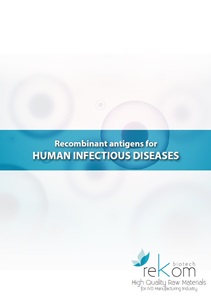Cytomegalovirus infection (CMV)
Cytomegalovirus infection is an infection caused by a type of herpes virus, human herpesvirus type 5 (CMV), belonging to the Betaherpesviridae family. It is part of the diseases included in the TORCH panel. The transmission of the virus is through contact with urine, saliva, mucus from the cervix, semen, feces and breast milk of the infected person. It can also be passed from mother to child during pregnancy (congenital CMV) or childbirth (perinatal CMV). It can also be the case of transmission through blood transfusion or organ transplant. The symptoms depend on the type of person infected, being more likely to be experienced by newborns and people with a weakened immune system. In the case of congenital CMV, the most common are premature birth, low birth weight, jaundice, liver and skin problems, microencephaly, large spleen, pneumonia, and seizures. In the case of perinatal CMV, the vast majority of cases are asymptomatic, but in premature babies a serious and even fatal infection can occur. People with weakened immune systems may have problems with organs such as the eyes, lungs, liver, esophagus, stomach, intestines, and brain. Most healthy people infected with CMV show no symptoms. In the case of having symptoms, they are very similar to those of infectious mononucleosis: fatigue, fever and muscle and throat pain. The most common treatment is the use of antivirals to slow down the reproduction of the virus, but not eliminate it. As prevention it is recommended to maintain good hygiene and take antivirals to prevent the disease in case of weakened immunity. The diagnosis of CMV is made by testing blood and other body fluids, as well as tissue samples.
Cytomegalovirus infection is a widespread worldwide infection, there is no cure, and, once contracted, the virus remains in the body for life. The vast majority of infected people do not know they are infected, as it rarely causes problems in healthy people. For pregnant women and people with a weakened immune system, it is a cause for concern, since it can be fatal. It is estimated that 60%-90% of adults have a CMV infection. The prevalence increases with age, with people of low socioeconomic levels tending to have a lower prevalence. CMV is the virus most frequently transmitted to the fetus. It is estimated that it affects 0.2-1% of newborns worldwide. Only about 10% of newborns with congenital infection are symptomatic at birth. The rest appear healthy at birth. It's months, or even years, when they begin to show symptoms, such as hearing loss and developmental delay.
Human infectious disease.
At Rekom Biotech, we desing and manufacture IVD reagents for diagnosis of Cytomegalovirus infection (CMV). If you do not find what you are looking for, you can request our custom-made recombinant proteins/antibodies service. Do not hesitate to contact us!
Recombinant proteins
Polyclonal antibodies
How to reconsitute lyophizated vials
Polyclonal antibodies against Cytomegalovirus (CMV)
Recombinant antigens for the diagnosis of Cytomegalovirus (CMV)






